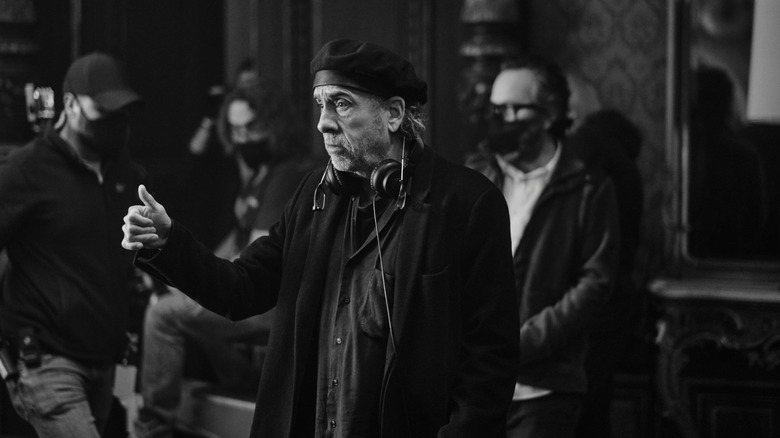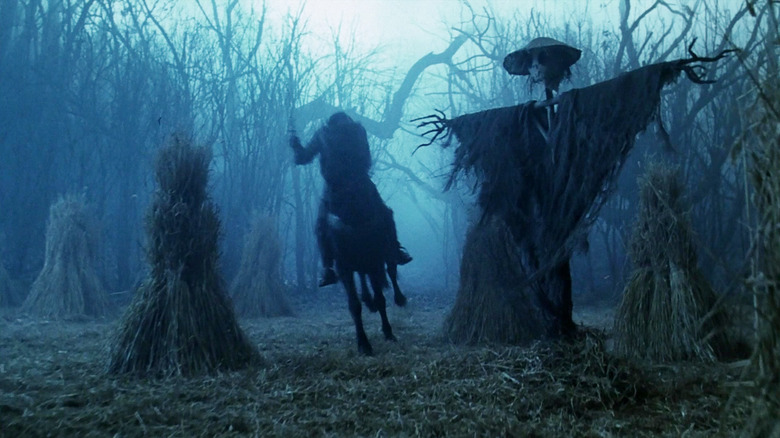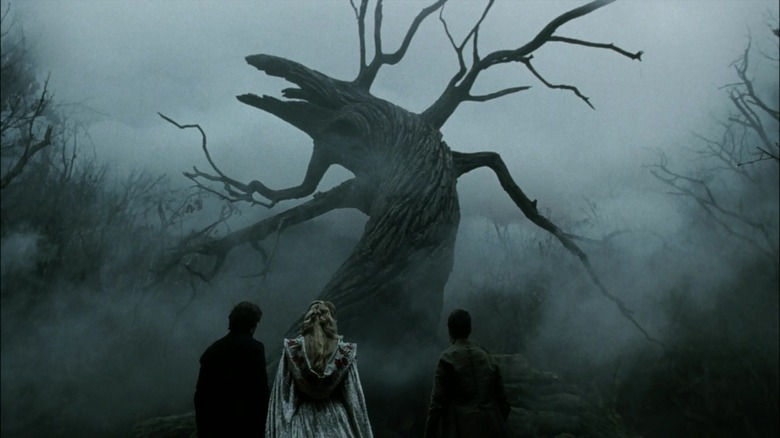How Tim Burton's Canceled Superman Movie Led To One Of His Best Films
Tim Burton has always been an outlier in Hollywood. He's a filmmaker with a distinct, peculiar aesthetic and set of interests, yet his movies have broad appeal and are remarkably consistent in the way they perform financially. (To quote veteran screenwriter Zack Stentz, "It's as if Wes Anderson had Michael Bay's box office record.") Even Burton's weakest franchise films bear the sort of directorial hallmarks that are often missing from tentpoles in the 21st century. Indeed, say what you will against his "Dark Shadows," but only Burton could have enough pull to get a $150 million movie reboot of a cult '60s soap opera oddity green-lit in 2012 while also making it precisely the way he wanted. It's the same reason the critically-derided horror-comedy has found its share of defenders.
Be that as it may, having to deal with the relentless friction between creativity and commerce has taken its toll on Burton in the past. His 1996 sci-fi comedy "Mars Attacks!" might be celebrated in certain circles as one of the most blatantly bizarre blockbusters of the '90s, but actually realizing his uncompromising vision left Burton so exhausted that he apparently, very literally, fled the country for an extended hiatus from Hollywood afterwards. It's also been said (by certain parties in the know) that Burton's clashes with Warner Bros. over "Mars Attacks!" — combined with the film's disappointing commercial returns — was quite likely a contributing factor in the studio's infamous decision to axe the director's Nicolas Cage-led DC Comics movie "Superman Lives" just a couple of years later.
"After 'Superman,' I didn't know what to do," Burton admitted in the book "Burton on Burton" (which was edited by Mark Salisbury). It was only then that he received the script for a horror film inspired by Washington Irving's famous 1820 short story "The Legend of Sleepy Hollow." Almost right away, Burton knew he'd found what he was looking for.
Superman died so Sleepy Hollow could live
Contrary to the film's numerous Burtoneque quirks and motifs, 1999's "Sleepy Hollow" didn't originate as a script written intentionally for Burton to direct. Rather, it was the brainchild of Kevin Yagher, the venerated makeup effects artist who not only helped bring Freddy Krueger and the homicidal Chucky doll to life, but also built and designed the Crypt Keeper for HBO's "Tales from the Crypt" horror anthology series. (Yagher and his brother Chris were additionally the creatives behind the many disgusting corpses featured on Fox's long-running procedural "Bones.") By 1994, Yagher had even helmed some episodes of "Tales from the Crypt" and was keen to make his feature directing debut, which led to him coming up with the idea of turning Irving's folktale into a grisly horror flick.
Yagher's agent subsequently introduced him to Andrew Kevin Walker, who had previously penned the "Tales from the Crypt" episode "Well Cooked Hams." Walker, like Yagher, was looking to take his career to the next level at the time, having written a much-buzzed-about spec screenplay titled "Seven" (a title that will probably ring a bell). With Walker writing the script and Yagher set to direct based on the treatment they had cooked up, all seemed to be going swimmingly, with now-disgraced mega-producer Scott Rudin having boarded the project and sold it to Paramount. Instead, the whole thing ended up falling in limbo, where it remained until the summer of 1998.
As fate had it, Yagher and Walker's misfortune proved to be a stroke of good luck. In the same way, "Superman Lives" falling apart was a secret blessing for Burton, freeing him up to read the "Sleepy Hollow" script just after Walker's career had sky-rocketed and any screenplays bearing his name had suddenly become hot commodities. "[T]hey sent me this script and I really like it, it was very strong," Burton recalled in "Burton on Burton." He also noted that the project was "more of a [pure] horror film" than anything he had done before, "and it's funny, because those are the kind of movies that I like probably more than any other genre."
That OTHER time Burton returned to his practical roots
Few flicks offers pure, distilled spooky vibes the way Burton's "Sleepy Hollow" does. (Even the film's janky late-'90s era website was bewitching, as yours truly can attest.) The plot is, admittedly, a little convoluted, re-imagining the superstitious schoolmaster Ichabod Crane from Irving's source material as an anxious, science-minded 18th century police constable (played by Johnny Depp) who uncovers a ghastly conspiracy involving the small village of Sleepy Hollow and the headless, blade-swinging phantom of a sadistic Hessian mercenary (played by Ray Park and Christopher Walken). To a certain extent, though, that only makes "Sleepy Hollow" all the more faithful an homage to classic Hammer Horror pictures of the 20th century, which also tend to make up for their over-elaborate story machinations with their eloquent, Gothic, handmade production values and atmosphere.
Once again, you can thank "Mars Attacks!" and "Superman Lives" for that. After using a fair amount of CGI on the former and having no doubt done a significant amount of pre-viz work for the latter's intended digital effects, Burton was keen to return to his practical roots on "Sleepy Hollow." "I wanted to get back to making a movie where you're building sets and dealing with actors and doing things that are less manufactured, less computerized — just making an old-fashioned movie that way. It's the hardest time, but my favorite time is being on the set, which is where you're making this stuff," as he recalled in "Burton on Burton." Aiding the cause, Burton surrounded himself with only the very best craftspeople, including director of photography Emmanuel Lubezki (who would later win Oscars for his work on "Gravity," "Birdman," and "The Revenant"), Burton's illustrious long time costume designer Colleen Atwood, and even Kevin Yagher himself (who served as a creature effects coordinator).
25 years later, the final outcome still stands as one of Burton's best films. To be sure, if "Sleepy Hollow" and Burton going back to do-it-yourself effects once more in "Beetlejuice Beetlejuice" are proof of anything, it's that the man is better off steering clear of "Superman Lives"-level CGI-fests for the rest of his life.


